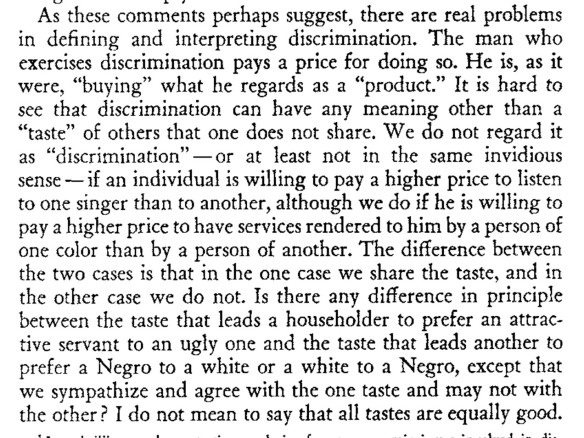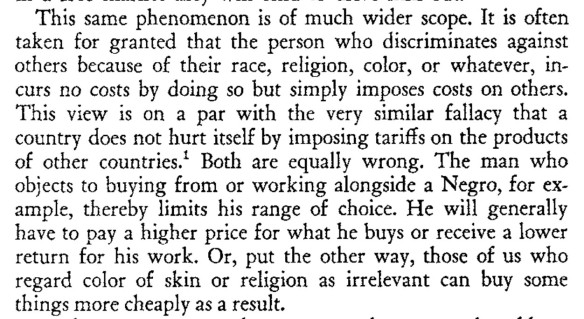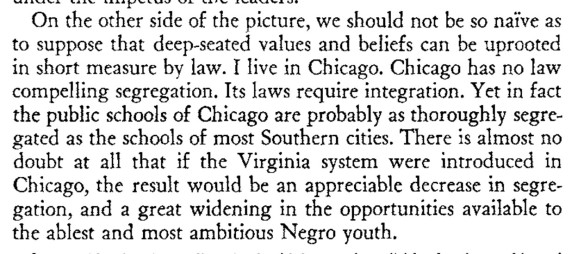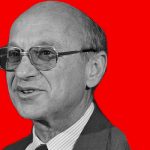By John Jackson
June 23, 2019
White people have the luxury of not thinking about race if they don’t want to. Marginalized people, on the other hand, are forced to think about their own oppression all the time if they want to get by in the world. One way to think about this luxury is what philosopher Charles Mills calls “white ignorance.” In scholarship, one way the white ignorance is displayed is by white scholars, whom Critical Race Theorist Richard Delgado called “imperial scholars,” who ignore the scholarship of people of color. The poster child for white ignorance may well be Milton Friedman.
Milton Friedman was one of the most famous economists of the twentieth century. The leading light of the “Chicago School of Economics,” the most influential economics department in the world, Nobel prize-winner in Economics in 1976. If there were an All-Star team of economists, Friedman would be in the starting line-up. My view of him was nicely summarized by Murray Rothbard in 1964: “I am getting pretty p.o.’ed at the influence of that little bastard anyway; he is the No.1 respectable right-wing economist in Newsweek and Business Week, and Goldwater’s chief economic theoretician.” (Rothbard to James Martin, Martin Papers, University of Wyoming).
My focus is on Friedman’s chapter on “Capitalism and Discrimination” in his 1962 book, Capitalism and Freedom, a book that has gone through several editions and is still in print. (How much would you pay for the first edition? Wrong! It is way more than that!). Friedman’s views on racial discrimination reflect a profound ignorance of how race operates in the world. This ignorance was inexcusable in 1962 and the fact that Friedman did not revise these views in the 1982 or 2002 editions show the pernicious power of his ideology which blinded him to the racial reality of the world.
Get Evonomics in your inbox
Friedman’s description of race relations rests on two assumptions. The first is that racial animosity is simply a “taste,” not unlike my love of pizza topped with Canadian bacon and sauerkraut (it is awesome, try it!). Here he states his position:

It is just a matter of taste, not that Friedman was a racist, since he disavowed any noxious views in that last sentence. Lest we forget, here is how the white people of Little Rock expressed their “taste” that the Little Rock Nine not attend Central High school a few years before Friedman wrote his book:

Second, Friedman argued the only thing we had to do to combat racial discrimination was……nothing. That’s right, if we just got rid of governmental interference with the marketplace, this whole “race discrimination” hoo-hah would fade away. Why, race prejudice would be as hard to find as Canadian bacon and sauerkraut pizza! You see, race discrimination doesn’t make economic sense and the market would soon punish racists if only we would do nothing save perhaps cluck our tongues and express our displeasure at a racist’s taste preferences:

It is when Friedman attempts to support these views with empirical evidence that his essay goes completely off the rails. If Phil Magness would still like to know the difference between an interpretation of evidence he finds in error and “making stuff up” I invite him to read Friedman’s essay. He made stuff up—making historical claims without any citation of supporting evidence, and leaving out evidence that clearly disproves the claim he asserted.
Capitalism, Racism, and Slavery
We don’t have to wait long. Here are Friedman’s opening sentences on how capitalism diminished discrimination:

He gives us a list of capitalism’s triumphs in these matters. Unsurprisingly, he doesn’t mention slavery. While slavery had existed in all times and places in human history the racialized slave trade that linked Europe, Africa, and the Americas was unique in human history because it was the direct result of colonialism and capitalism. “Racism” as an ideology was an outgrowth of the necessity of justifying the social relationships that capitalism had brought into existence. One of the first scholars who put forth this relationship was Trinidad-born Oliver Cromwell Cox who got a degree in economics from (set your irony meters to maximum) the University of Chicago in 1932 and his PhD in sociology from Chicago in 1938. Why sociology? As he wrote: “I felt that if the economists did not explain what I wanted to know; if economists did not explain the coming of the Depression and did not help me to understand the great economic change, then I felt I did not need it.” In 1948, Cox published Caste, Class, and Race: A Study in Social Dynamics. Cox correctly recognized that racism was a relatively recent phenomenon historically speaking (a view I show here in a different context). It was the direct result of colonial expansion under capitalism:
Sometimes, probably because of its very obviousness, it is not realized that the slave trade was simply a way of recruiting labor for the purpose of exploiting the great natural resources of America. ^^ This trade did not develop because Indians and Negroes were red and black, or because their cranial capacity averaged a certain number of cubic centimeters; but simply because they were the best workers to be found for the heavy labor in the mines and plantations across the Atlantic. …. This, then, is the beginning of modern race relations. It was not an abstract, natural, immemorial feeling of mutual antipathy between groups, but rather a practical exploitative relationship with its socio-attitudinal facilitation — at that time only nascent race prejudice. Although this peculiar kind of exploitation was then in its incipiency, it had already achieved its significant characteristics. As it developed and took definite capitalistic form, we could follow the white man around the world and see him repeat the process among practically every people of color. (332-3)
Perhaps because he was a person of color and thus relegated to low-status institutions, or perhaps because he was a (shhhhh!) Marxist, Friedman showed no knowledge of Cox’s powerful arguments in 1962. Friedman’s ignorance only becomes more pronounced with each subsequent edition of Capitalism and Freedom, as the capitalist origins of the slavery/racism nexus got more and more support from historians and sociologists. Anthropologist Peter Wade in a recent book on the subject notes:
Many more scholars see race as a concept and racism as a practice as having emerged in the West, and specifically in conjunction with European colonialism and domination: the conquest of the Americas, the African slave trade, the abolition of slavery, imperialism in Africa and Asia, Anglo-Saxon expansionism across the United States, the global expansion of capitalism and so on (Eze 1997; Hall 1992; Hannaford 1996; Smedley). (pp. 15-6)
Friedman’s original claim in 1962 might be forgivable—but his continued endorsement of it in 2002 is a demonstration of a deeply studied and purposeful ignorance of the literature on race and slavery.
Property Rights and Reconstruction
From worse to worse. Here is Friedman on the immediate post-Civil War United States, the period of Reconstruction, when the white south was trying to keep African-Americans enslaved in all but name:

Oh, yes, that “basic belief in private property.” Friedman does not mention that same basic belief in private property was the white south’s chief argument justifying slavery as in the Dred Scott decision:
The Constitution of the United States recognises slaves as property, and pledges the Federal Government to protect it. And Congress cannot exercise any more authority over property of that description than it may constitutionally exercise over property of any other kind.
After the Civil War, the idea of property rights was an effective tool used against African Americans. Again, this was documented well before 1962 when Friedman was writing. W.E.B. Du Bois, the pioneering African-American scholar and activist who published Black Reconstruction: An Essay Toward a History of the Part which Black Folk Played in the Attempt to Reconstruct Democracy in America in 1935. Du Bois recounted how notions of property were used as tools of oppression:
[Emancipation] would not go as far as economic emancipation for which…the freedmen clamored, because the industrial North instinctively recoiled from this and the Northern white working man himself had not achieved such economic emancipation. The politically enfranchised slave was accused, as every laboring class has been, of ignorance and bad manners, of poverty and crime. And when he tried to go to school and tried to imitate the manners of his brothers, and demanded real economic emancipation through ownership of land and right to use capital, there arose the bitter shriek of property, and the charge of corruption and theft was added to that of ignorance and poverty.
Not only did the United States never deliver on the promised “forty acres and a mule,” preferring to respect the property rights of white traitors to their country rather than the new black citizens who had actually labored the land, but the white south also refused to protect any of the property rights of African Americans that Friedman claimed was “so strong” that “it overrode the desire to discriminate against Negroes.” Du Bois reported testimony from the 1860s that:
Men who are honorable in their dealings with their white neighbors, will cheat a Negro without feeling a single twinge of their honor. To kill a Negro, they do not deem murder; to debauch a Negro woman, they do not think fornication; to take the property away from a Negro, they do not consider robbery.
Du Bois concluded:
The Negro’s access to the land was hindered and limited; his right to work was curtailed; his right of self-defense was taken away, when his right to bear arms was stopped; and his employment was virtually reduced to contract labor with penal servitude as a punishment for leaving his job. And in all cases, the judges of the Negro’s guilt or innocence, rights and obligations were men who believed firmly, for the most part, that he had “no rights which a white man was bound to respect.”
Du Bois pioneering work of 1935 has been reaffirmed again and again since his first published it. Friedman shows no knowledge of how historical scholarship completely undermined his central claims about Reconstruction.
Chicago’s Segregated Schools
Nancy MacLean in Democracy in Chains notes how Friedman supported James M. Buchanan’s plan for privatizing Virginia’s public schools, thus giving aid and comfort to the segregationist cause there. In 1962, the African-American students of Prince Edward County, Virginia, were without a school at all and the white students there were firmly ensconced in what was called their “segregation academy.” Friedman showed no concern for—indeed, he showed no knowledge of—this situation and assured his readers that privatization of schools was the key to desegregation:

The first sentence perfectly echoed the claims of the segregationists of the time who held that Jim Crow reflected public attitudes, thereby ignoring how the law inculcates attitudes as well. (I wrote a whole book on the integrationists’ answer to this argument). The last sentence was mere wishful thinking in the face of every bit of evidence supplied by Virginia in 1962. Let’s look at the middle sentences. Friedman seemed to imply, without quite saying so, that Chicago schools are segregated because Chicago has laws requiring integration and, as every libertarian claims, laws dictating behavior always result in the opposite behavior. But, perhaps that is over-reading what Friedman claimed. If that is the case then the cause of Chicago’s segregated schools is completely unexplained. Friedman just throws up his hands; it’s a mystery! The reason Friedman did not explain segregation of Chicago is the same reason that slavery went completely unmentioned in his book: it is because the cause of both Chicago’s segregation and American slavery was respect for property rights.
Chicago’s schools were racially segregated because they were neighborhood schools and the neighborhoods were racially segregated. Why were Chicago’s neighborhoods racially segregated? The answer was not government intrusion in the marketplace: city ordinances requiring racial segregation were declared unconstitutional in Buchanan v. Warley in 1917. This date coincided with the beginning of the Great Migration of African Americans from the rural south to the rural north. White northerners restricted African American neighborhoods with racially restrictive covenants.
Here’s how those covenants worked: A condition on a white person’s purchase of a house was predicated on the condition that, upon reselling the purchaser would never sell to “any person other than the Caucasian race.” Often, it was also agreed that the local homeowner’s association had the right to enforce this contract—the same kind of HOAs that currently regulate the colors you can paint your front door. All this was reinforced by real estate agents who knew that such properties guaranteed them higher prices:

By the 1940s, 80% of Chicago neighborhoods were controlled by racially restrictive covenants. Thus, all-white neighborhoods were virtually guaranteed by private contracts and property rights: the same rights that Friedman told us were the key to everyone’s freedom. This whole story was laid out in 1959 in an excellent book by historian Clement Vose entitled Caucasians Only, a book Friedman could have read if he wasn’t convinced that he knew all the answers because of his blind faith in the free market.
The NAACP actually spent more time and money fighting restrictive covenants than they did school segregation. They were victorious in 1948 when the Supreme Court held that such covenants were unenforceable in Shelley V. Kraemer. Seventy years later libertarians are still arguing over whether or not Shelley was rightly decided or not.
In a previous post I argued that so-called constitutional originalists were engaged in a project that attempted to rewrite the past by trying to explain how the Brown decision could have been decided on originalist grounds and ignoring the fact that originalist doctrines were used for two decades to attempt to reject Brown. Some libertarians are engaged in similar projects: trying desperately to rewrite the past by arguing that those who supported racially restrictive covenants weren’t “really libertarians” or that slavery had nothing to do with 19th century versions of sacred property rights. Friedman’s 1962 book is an example of selective memory, evidence-free claims about the past (literally “making it up”), and letting his libertarian ideology decide the empirical question about how the world works. In 1962, he accomplished this by ignoring the scholarship of people of color like Cox and Du Bois. Forty years later, when he wrote that he was “enormously gratified by how well the book has withstood time and how pertinent it remains to today’s problems” the only explanation for his crowing (rather than an abject apology) was a studied, willful ignorance of the historical record. Since World War II, libertarians have resolutely stood on the wrong side of racial justice, I see no reason to believe they have a grasp of it now.
2019 June 23
Originally Published at Fardels Bear blog here.
Donating = Changing Economics. And Changing the World.
Evonomics is free, it’s a labor of love, and it's an expense. We spend hundreds of hours and lots of dollars each month creating, curating, and promoting content that drives the next evolution of economics. If you're like us — if you think there’s a key leverage point here for making the world a better place — please consider donating. We’ll use your donation to deliver even more game-changing content, and to spread the word about that content to influential thinkers far and wide.
MONTHLY DONATION
$3 / month
$7 / month
$10 / month
$25 / month
You can also become a one-time patron with a single donation in any amount.
If you liked this article, you'll also like these other Evonomics articles...
BE INVOLVED
We welcome you to take part in the next evolution of economics. Sign up now to be kept in the loop!























